Offer
Provide additional details about the offer you're running.
This store requires javascript to be enabled for some features to work correctly.

Wondering what the best multivitamin UK NHS is according to NHS guidelines? In this article, we’ll explore NHS recommendations, compare top multivitamin brands, and help you make an informed choice. The Department of Health and Social Care advises vitamin supplements in specific situations such as after bariatric surgery, during pregnancy, and for vitamin D during autumn and winter. For children, a daily dose of vitamins A, C, and D is recommended to support growth and development. Babies consuming more than 500ml (about a pint) of infant formula daily should not receive additional vitamin supplements, as the formula already contains essential vitamins and nutrients. The best multivitamin UK NHS is often discussed among patients seeking guidance on nutritional support.
The NHS recommends obtaining nutrients primarily through a balanced diet and only prescribes supplements for medically diagnosed deficiencies.
Popular multivitamin options like Forceval and Centrum offer different formulations; Forceval is prescription-based while Centrum provides a range of chewable and gummy forms.
For bariatric patients, simplified multivitamin options like Bari Enhance can reduce tablet burden and improve compliance while providing essential nutrients. The best multivitamin UK NHS may vary depending on specific needs.
Multivitamins are dietary supplements that combine essential vitamins and minerals to support overall health and wellbeing. They are designed to fill nutritional gaps in your diet, ensuring you receive all the necessary nutrients for optimal health. A daily multivitamin can help provide vital nutrients like vitamin D, calcium, and iron, which are crucial for maintaining various bodily functions. The best multivitamin UK NHS options often prioritise these key nutrients.
These supplements come in various forms, including tablets, capsules, and chewable tablets, making them convenient for people of all ages. It’s important to choose a multivitamin that suits your age, diet, and lifestyle to maximize its benefits. For instance, children might prefer chewable tablets, while adults might opt for capsules or tablets. The best multivitamin UK NHS includes those with evidence-based doses of core vitamins.
While a balanced diet rich in fruits, vegetables, whole grains, and dairy products is the best way to get all the necessary nutrients, multivitamins can be a useful supplement for those who may not get enough nutrients from their diet alone. Always consult with a healthcare professional before starting any supplement, including multivitamins, to ensure you’re getting the right nutrients for your specific needs.
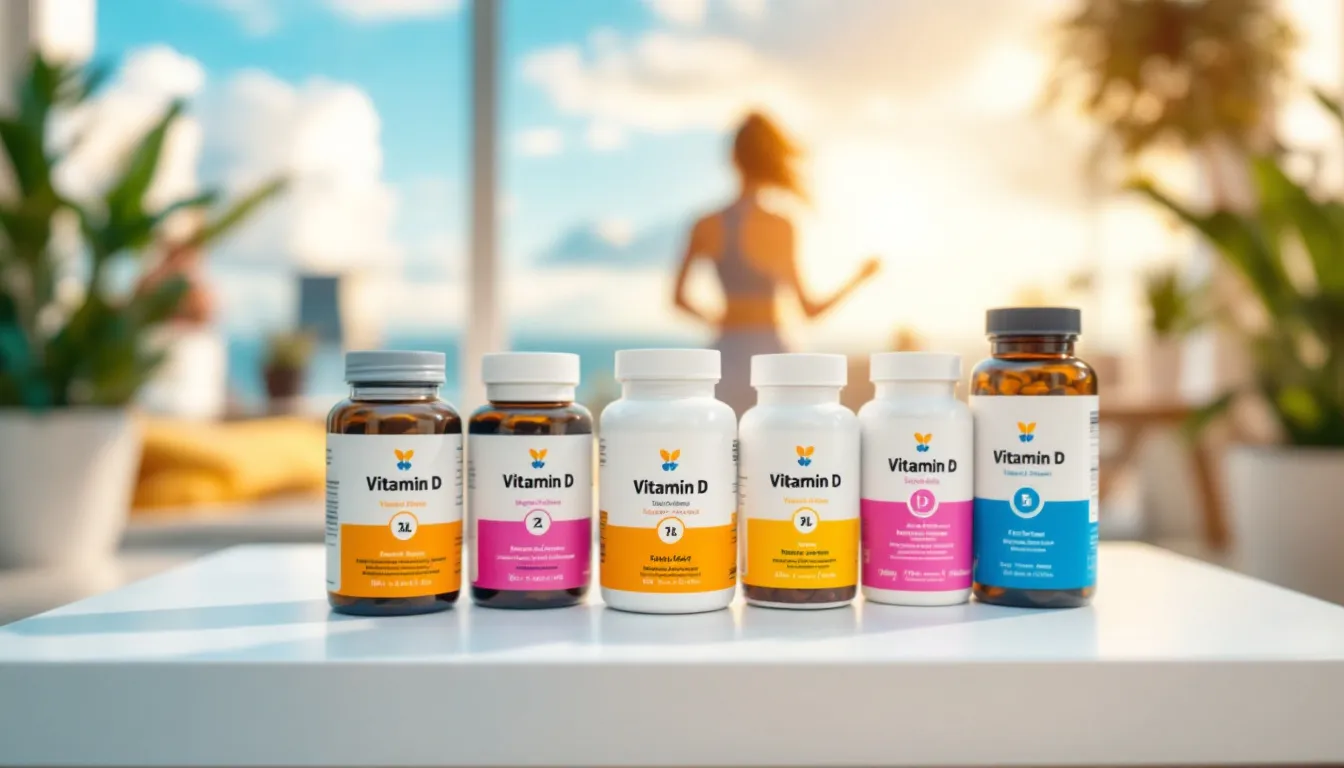
The NHS advises that vitamin and mineral supplements should primarily be used in cases of a medically confirmed deficiency. This position is taken to promote cost-effectiveness in healthcare, as well as to encourage the intake of essential nutrients from a balanced diet rather than through supplementation. The best multivitamin UK NHS advice emphasises dietary sources first, supplements second. If we eat a balanced diet including foods from all food groups, it is likely that we are meeting our vitamin and mineral requirements from food alone. However, the government recommends that all children aged 6 months to 5 years are given vitamin supplements containing vitamins A, C, and D every day. The government also recommends a daily vitamin D supplement for infants, particularly for breastfeeding babies. Young children should still have vitamin drops, even if they get out in the sun.
Babies consuming more than 500ml of infant formula per day do not require additional vitamin supplements due to the fortification of vitamins A, C, and D in the formula. The best multivitamin UK NHS recommendations reflect age-specific and risk-based supplementation needs.
Multivitamins can play a crucial role in bridging nutritional gaps in your diet, providing essential vitamins and minerals like vitamin C, vitamin D, and calcium. These nutrients support various bodily functions, including immune system health, energy production, and overall wellbeing. The best multivitamin UK NHS products typically offer these in bioavailable forms.
For individuals with restricted diets, such as vegetarians or vegans, multivitamins can be particularly beneficial in ensuring adequate intake of nutrients like iron and zinc. Pregnant women, breastfeeding mothers, and growing children may also benefit from multivitamins to ensure they receive all the necessary nutrients for healthy development. The best multivitamin UK NHS solutions are especially useful for high-risk groups.
In addition to supporting immune function, multivitamins can promote healthy skin, hair, and nails, as well as eye health and brain function. Some multivitamins contain antioxidants like selenium, which help protect against cell damage and reduce the risk of chronic diseases.
It’s important to note that while multivitamins offer numerous benefits, they should not replace a healthy diet and lifestyle. Always follow the recommended dosage and consult with a healthcare professional before taking any supplement, including multivitamins, to ensure you’re meeting your nutritional needs safely.
There are various types of multivitamins available to cater to different needs and preferences. These include tablets, capsules, chewable tablets, and liquid formulations. The best multivitamin UK NHS recommendations tend to favour simplicity and compliance. Some multivitamins are designed for specific age groups, such as children, adults, or seniors, while others are formulated for specific health needs, like pregnancy or men’s health.
Multivitamins can also be categorized based on their ingredients, such as vitamin D supplements, calcium supplements, or iron supplements. Additionally, some multivitamins are labeled as “food-based” or “whole food” supplements, meaning they are made from concentrated foods rather than isolated vitamins and minerals.
For those with specific dietary needs, there are multivitamins that are gluten-free, vegan, or vegetarian. It’s essential to choose a multivitamin that suits your individual needs and health status. Always read the label carefully and look for certifications from reputable third-party organizations, such as the National Science Foundation (NSF) or the United States Pharmacopeia (USP).
Consult with a healthcare professional if you have any questions or concerns about choosing the right multivitamin. This ensures you select a product that aligns with your dietary requirements and overall health goals.
Source: NHS Vitamins and Minerals
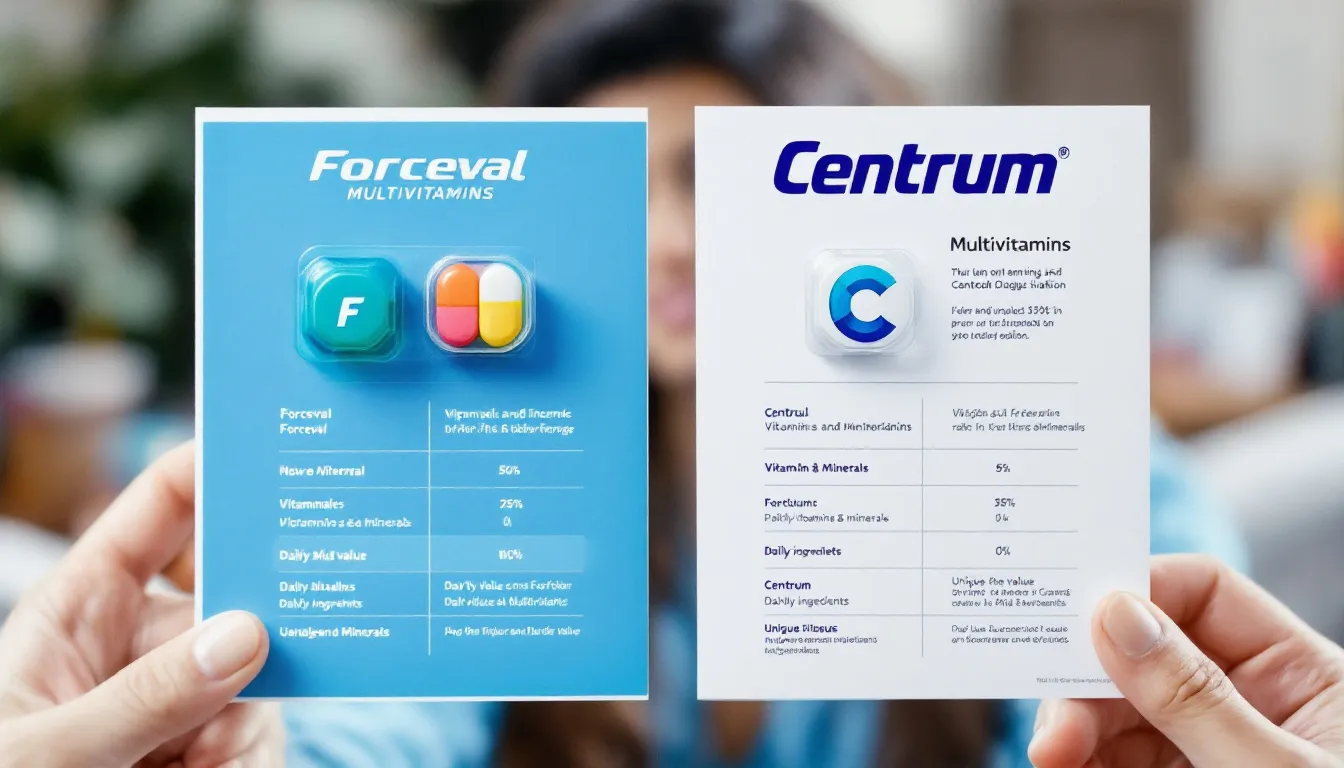
Forceval and Centrum stand out as prominent names in the realm of popular multivitamins. Forceval boasts a formula containing 12 vitamins and minerals each, catering specifically to those with special dietary requirements or particular health conditions. In contrast, Centrum delivers an extensive array of vitamins and minerals aimed at bolstering overall well-being in adults across different age brackets, while also addressing distinct health concerns through tailored formulations. The best multivitamin UK NHS often includes Forceval in prescription settings, but many patients seek over-the-counter alternatives.
In terms of pricing, Forceval Presents a higher cost compared to Centrum due to its prescription nature. Nevertheless, for children or individuals who struggle with swallowing pills, Centrum provides more accessible options such as chewable tablets and gummy forms that simplify the process of taking their daily dose of multivitamin. .
With effervescent tablets designed for ease-of-use, especially post-illness or surgery recovery periods, Forceval is optimized for consumption convenience. On the other hand, people often opt for Centrum when seeking everyday nutritional reinforcement thanks to its widespread availability along with varied formulations catered to various needs. The decision between these two will ultimately hinge on your individual health prerequisites and personal preferences. The best multivitamin UK NHS options balance convenience, tolerability, and affordability
Bariatric patients may find the NHS’s prescribed supplement regimens to be quite demanding, as these often require taking numerous pills throughout the day, splitting doses, and managing separate prescriptions for iron, B12, multivitamins, and other dosages. The intricate nature of this routine can contribute to reduced adherence and rising costs. The best multivitamin UK NHS for bariatric patients is one that reduces tablet burden and maintains clinical alignment.
Products such as Bari Enhance offer a streamlined approach with their once daily capsule that contains iron, B12, vitamin D3 among other critical nutrients in quantities tailored to meet post-operative requirements. Consulting a doctor is essential to ensure the chosen multivitamin meets post-operative requirements. Bari Enhance is designed using gentle forms like Iron bisglycinate that help avoid gastrointestinal discomfort frequently experienced with high-strength iron supplements. The best multivitamin UK NHS alternatives outside prescription channels can improve long-term outcomes.
Although not available through an NHS prescription system. Offerings like simplified bariatric multivitamins aim to lessen pill fatigue while enhancing compliance over extended periods. For example: By merging various essential nutrients into one singular capsule form (which helps reduce the number of individual tablets needed), items similar to “Bari Enhance” serve as ideal alternatives for those grappling with complexity or prohibitive expenses typically associated with standard bariatric vitamin protocols.
Selecting an item akin to “Bari Enhance” could potentially assist patients searching for an economical non-prescription option capable of fulfilling their nutritional demands without fail. It comes at a competitive price point close relative cost-wise compared to usual multivitamin products out there & presents users subscription service ensuring consistent supply availability regarding vital nutrient supplementation needs.
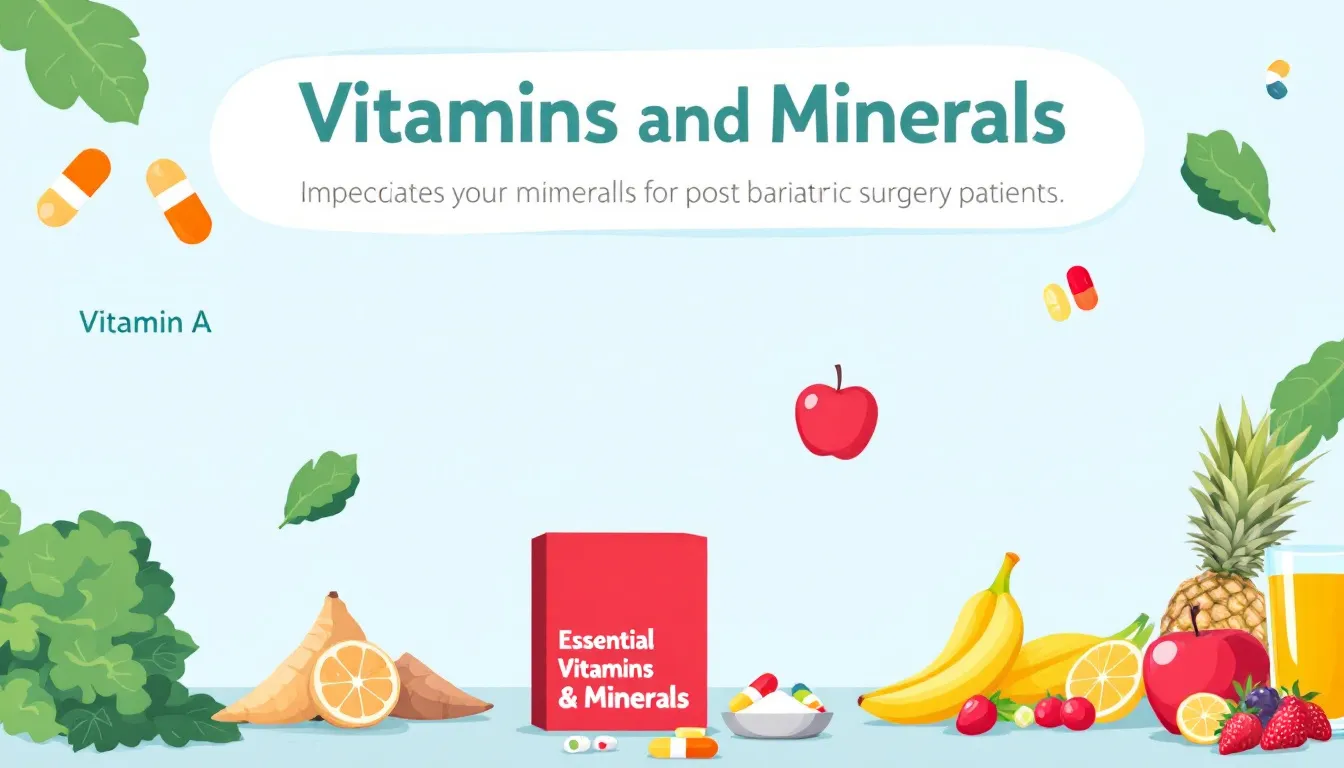
Following bariatric surgery, it is essential for patients to adhere to a lifelong regimen of multivitamin and mineral supplements due to the alteration in food consumption and nutrient absorption. The risk of deficiencies in vitamins and minerals increases as these individuals consume less food, endure malabsorption issues, face reduced levels of gastric acid, and have diminished stores of nutrients. Fat soluble vitamins, such as A and D, are stored in the body and can lead to overdoses if taken in excess. During the autumn and winter, it’s harder to get enough vitamin D through sunlight on the skin, making supplementation even more critical for maintaining adequate levels. The main source of vitamin D is summer sunlight on our skin.
To address the altered capacity for absorbing vitamin B12 through digestion post-surgery, injections are advised every three months because both dietary sources and oral supplements may be ineffective. Iron supplementation is vital, especially for women who are menstruating as well as those suffering from anemia, in order to stave off shortages.
Calcium stands out as another crucial nutrient that supports healthy bones and teeth along with aiding muscle function. It’s important that patients stagger their intake of iron and calcium by at least two hours so each mineral can be absorbed efficiently. These critical vitamins and minerals must be consumed regularly to safeguard health against significant complications arising from nutritional deficits.
After bariatric surgery, the body’s ability to absorb nutrients significantly changes. Patients are at risk of deficiencies due to reduced food intake, malabsorption, and lower gastric acid production. The best multivitamin UK NHS for post-op care includes high-dose B12, iron, and fat-soluble vitamins in absorbable forms.
Key nutrients include:
Vitamin B12: Typically requires injections every three months due to absorption issues.
Iron: Critical for preventing anemia, especially in menstruating women.
Calcium and Vitamin D: Essential for bone health and muscle function; must be spaced apart to avoid absorption interference.
Regular supplementation is critical to avoiding long-term complications like bone loss, fatigue, and neurological issues.
Source: NHS Bariatric Dietetics Leaflet - Chelsea & Westminster
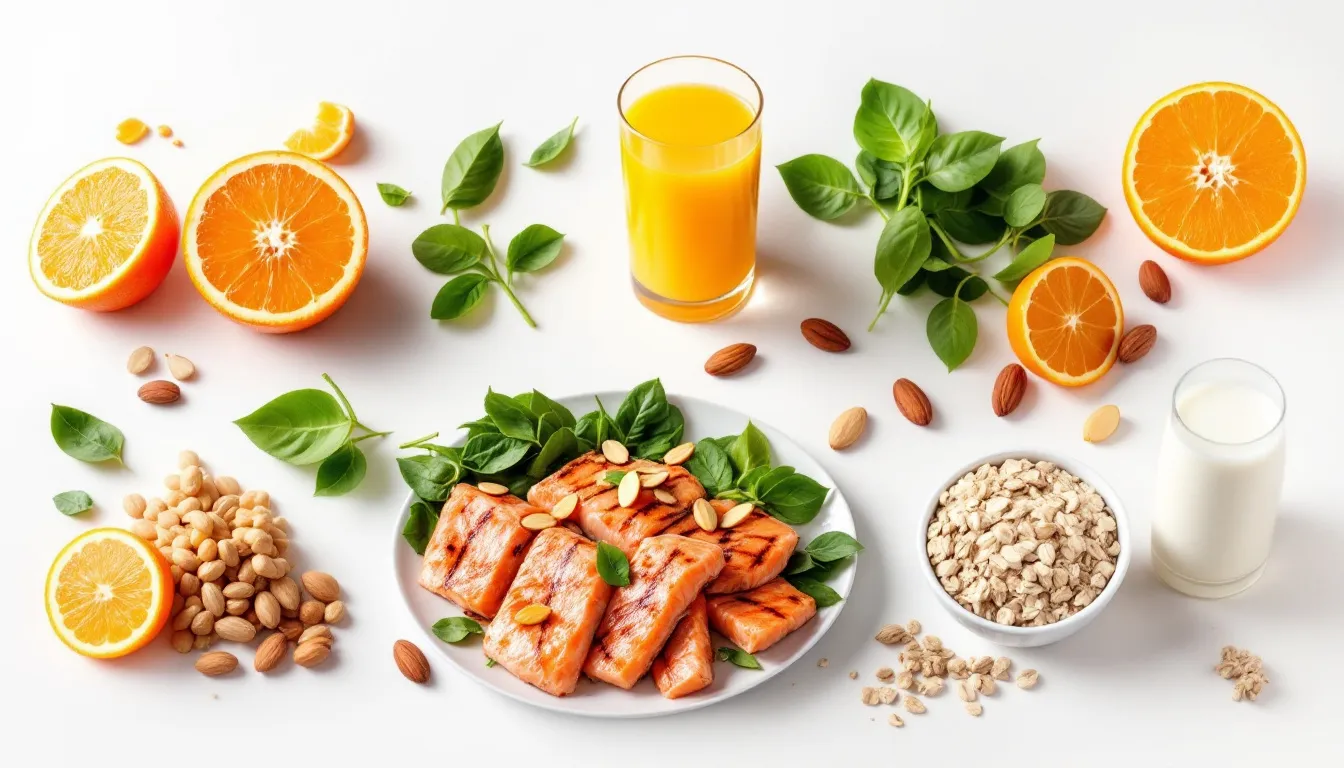
Make certain that your multivitamin comprises all the vital vitamins and minerals required by the body in minimal amounts for optimal functioning. For instance, vitamin C bolsters the immune system while enhancing iron absorption from plant-derived foods. Zinc is also an essential nutrient that reinforces immune capabilities and plays a pivotal role in healing wounds. It’s important to note that the exact nutritional content of multivitamins can vary significantly between individual products and brands, so always check the label to ensure it meets your needs. Vitamin D is only found in a few foods, such as oily fish and eggs.
While multivitamins can help provide all the nutrients, they should not replace a varied diet. It’s common to find dietary insufficiencies involving nutrients such as calcium, vitamin D, and potassium. These are provided at 100% daily value within most multivitamins. By confirming your multivitamin encompasses these key nutrients, you can help uphold overall healthiness and wellbeing. The best multivitamin UK NHS will meet or exceed daily NRVs for these nutrients in line with BOMSS guidance for bariatric patients.
Considering the value for money of multivitamins is essential for numerous people. A balanced diet typically supplies all the necessary vitamins and minerals, thus making dietary supplements superfluous for the majority. This aligns with NHS practices that endorse supplement prescription only when a medical professional identifies a deficiency. Excess water-soluble vitamins, like vitamin C, are excreted in urine when the body has sufficient amounts. Daily vitamin supplements can provide important nutritional insurance for millions of users looking to safeguard their nutritional intake. The best multivitamin UK NHS should provide clinical-grade nutrition at a manageable price point.
For various patients, purchasing over-the-counter multivitamins can be more economically viable than obtaining prescribed vitamins through the NHS. The best multivitamin UK NHS can also help reduce NHS burden by improving self-management. Consequently, these are often recommended to those who do not suffer from vitamin deficiencies. To alleviate pressure on NHS prescriptions and foster economical healthcare management, community pharmacists are advised to resort to over-the-counter remedies when addressing minor health issues.
Long-term empirical studies indicate that taking multivitamins regularly does not substantially diminish mortality risks in individuals who are already healthy. Henceforth, while there may be advantages associated with multivitamin consumption, they should never replace maintaining a wholesome lifestyle coupled with adhering to a well-rounded diet.
The habitual intake of multivitamins may contribute to a reduction in the likelihood of enduring conditions such as heart disease and diabetes over an extended period. Studies have shown that individuals who take multivitamins tend to exhibit enhanced overall health and may enjoy a greater life expectancy than those who do not. The best multivitamin UK NHS balances long-term safety with sustained nutritional adequacy.
Changes to metabolism in patients with chronic kidney disease (CKD) can lead to vitamin deficiencies, particularly due to dietary restrictions and vitamin loss during dialysis.
Probiotics, Omega-3 fatty acids, and other essential nutrients are crucial for preserving health across one’s lifespan while also averting diseases caused by nutrient deficiencies. Nevertheless, the long-term viability of employing multivitamin supplements is contingent upon weighing their positive effects against potential environmental repercussions associated with their production and packaging processes.
Investigations continue regarding the ecological impact stemming from sourcing materials used in manufacturing multivitamins. It underlines the importance for brands to adopt environmentally friendly practices. Although substantial health benefits can be gained through taking multivitamins consistently, it remains important to consider both personal requirements and ecological considerations.
When making a decision on the appropriate multivitamin, several factors must be taken into account. It’s important for parents to engage in discussions with pharmacists regarding the most suitable vitamin supplements for their children. In cases where there are particular health issues concerning multivitamins, seeking advice from a healthcare professional is recommended for effectively addressing those concerns. The best multivitamin UK NHS will be backed by clinical logic and good manufacturing practice.
Opting for a comprehensive mix of vitamins is wise. Such as selecting products offering 100% daily values of numerous nutrients and comprising critical micronutrients including vitamins A, C, D and various B vitamins. However, the best multivitamin UK NHS advice emphasises individual needs over general supplementation.
Administering a multivitamin alongside meals can improve nutrient uptake while reducing any possible gastrointestinal upset. The selection process involves evaluating nutritional content against personal health needs. Taking these elements into consideration allows you to pick out a multivitamin tailored specifically to your dietary requirements and overall well-being goals.
The need for multivitamin supplementation becomes essential in certain medical situations — particularly after bariatric surgery. Procedures like gastric bypass or sleeve gastrectomy significantly reduce the body’s ability to absorb key nutrients such as iron, B12, vitamin D, and calcium. The Department of Health also recommends that all children under the age of five receive a Vitamin D supplement to support their growth and development. Breastfeeding infants should receive a daily vitamin D supplement from birth. Very strict vegetarians may need supplementary vitamin B12, and those who are pregnant or breastfeeding should also consider supplements – especially vitamin D.
Post-surgery, patients are at increased risk of long-term deficiencies due to reduced food intake, changes in stomach acid, and bypassed absorption sites. Lifelong multivitamin use is typically recommended by dietitians and bariatric teams to prevent complications such as anemia, bone loss, or neurological symptoms. If parents are concerned about their child's diet, they should consult healthcare professionals.
Multivitamins are also essential during periods of increased need — such as recovery from illness, during or after pregnancy, post-surgery such as after bariatric surgery, or when dietary intake is limited due to appetite suppression or food intolerances common after bariatric procedures. Baby formula is fortified with vitamins A, C and D, and babies consuming more than 500ml of formula should not take additional vitamin supplements. The Healthy Start program provides free vitamins for eligible families.
Source: UHSussex NHS Bariatric Guidance
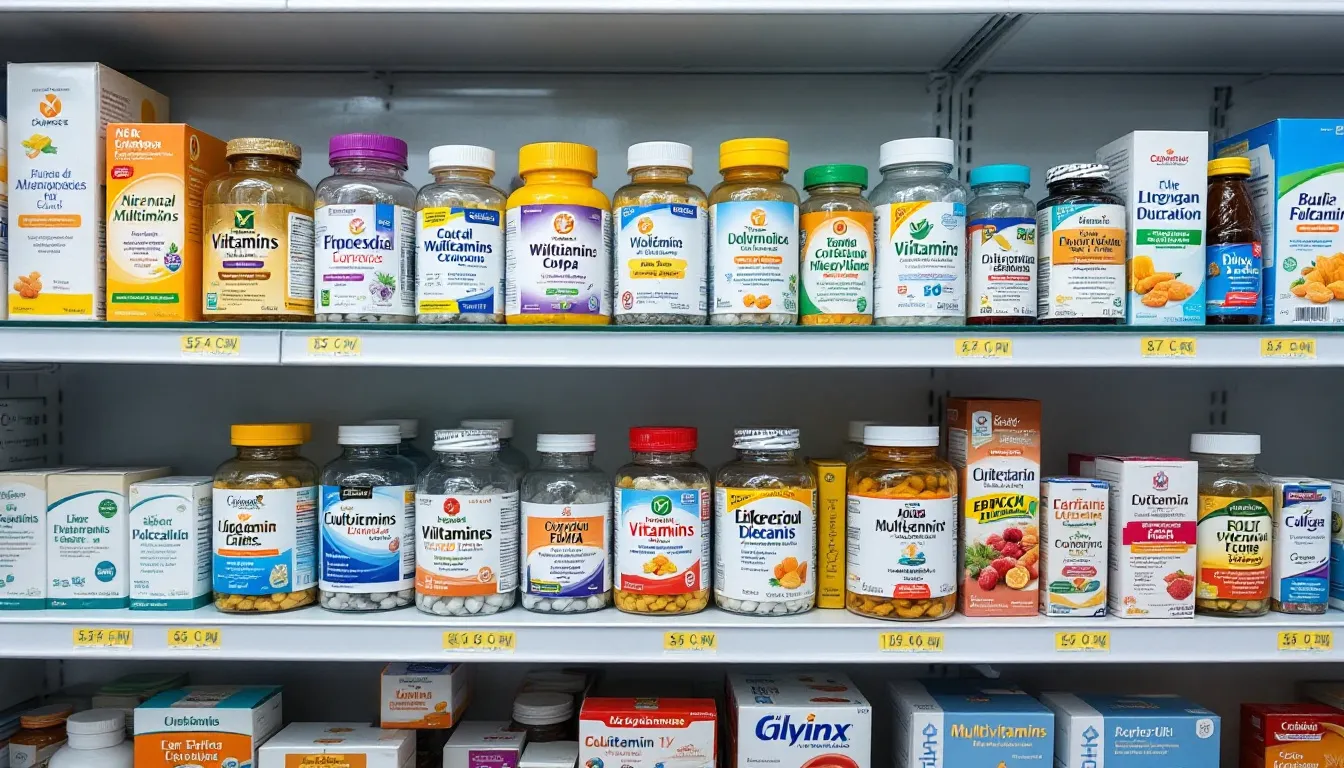
You can find multivitamins at numerous locations, including pharmacies, supermarkets, and through online retailers. The benefit of these platforms is that they often offer a range of multivitamin choices with the added convenience of home delivery to help you keep up with your daily supplement regimen. The best multivitamin UK NHS is one that is accessible, well-formulated, and backed by professional guidance.
For further information, readers can contact their local pharmacy or healthcare provider.
It’s essential when acquiring multivitamins to do so from trustworthy sources. These supplements are readily available over-the-counter at various stores such as pharmacies and supermarkets. It’s crucial to pick products tailored to your individual health requirements. For any uncertainties regarding which supplement might be right for you, always seek advice from a healthcare professional.
To sum up, familiarizing oneself with NHS guidelines and evaluating widely-used selections such as Forceval and Centrum, to contemplating streamlined options for bariatric multivitamins, can lead you to the most suitable decision tailored to your health requirements. Reviewing these can help you choose the best multivitamin UK NHS for your situation. The best multivitamin UK NHS for you will depend on age, risk factors, and tolerance.
It is important to keep in mind that although multivitamins are essential for preserving good health, they are meant to enhance a balanced diet rather than substitute it. For those who are pregnant or breastfeeding, considering vitamin D and folic acid supplements is particularly important. To maximize the benefits of your supplements, make well-informed decisions and seek advice from medical experts when needed.
Many bariatric patients prefer Bari Enhance due to its simplicity, comprehensive formula, and ease of use.
Some products lack adequate doses of critical nutrients like iron, B12, or vitamin D, or contain forms that are harder to absorb post-surgery.
Most patients require B12 injections every three months unless taking a supplement with a high enough dose of methylated B12.
Patients typically require Vitamin B12 injections after bariatric surgery every three months to maintain appropriate levels.
To reduce unnecessary spending, the NHS only prescribes vitamins when there’s a confirmed deficiency. Most people are expected to get nutrients through diet or over-the-counter products.
You can buy multivitamins at pharmacies, supermarkets, and various online retailers.
These options provide convenient access to a wide variety of choices.
Visit www.barienhance.com to order Bari Enhance directly with single-purchase or subscription options.
Join thousands of UK patients using Bari Enhance to simplify post-op nutrition.